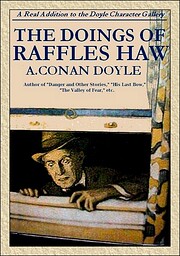

Click on a thumbnail to go to Google Books.
|
Loading... The Doings of Raffles Haw (1891)by Arthur Conan Doyle |
Current DiscussionsNonePopular covers
 Google Books — Loading... Google Books — Loading...GenresMelvil Decimal System (DDC)823.912Literature English & Old English literatures English fiction 1900- 1901-1999 1901-1945LC ClassificationRatingAverage: (3.21) (3.21)
|
Raffles, however, does not see differently, and the root of this lies in the fact that he's a chemist: he says at one point, "Chemistry is to a large extent an empirical science, and the chance experiment may lead to greater results than could, with our present data, be derived from the closest study or the keenest reasoning" (94). Raffles does not see, he does.
It's also just dull. Basically the premise of the book is that Raffles shows off all the inventions he will use to change the world for, like, a hundred pages (he has, gasp, an electric elevator!), but then he's persuaded not to do it because helping people out of their problems destroys their self-reliance: a local villager has his roof blown off in a storm, and back in the day he could have fixed it himself, but since becoming accustomed to Raffles's assistance, all he is able to do is send off letters and wring his hands helplessly. So don't help poor people; the status quo is all: "he dimly saw that vast problems faced him in which he might make errors which all his money could not repair. The way of Providence was the straight way. Yet he, a half-blind creature, must needs push in and strive to alter and correct it. Would he be a benefactor? Might he not rather prove to be the greatest malefactor that the world had seen?" (130). Raffles's problem, then, turns out to be that he does not see, that he only experiments: but experimenting with society is much more dangerous than experimenting with chemicals.
I have my philosophical objections to this conclusion: how can the solution to making the world a better place possibly be leaving it as we found it? Especially given that the world's problems don't descend from Providence, they're problems that we made with the way we built society. But it also makes for a boring book. He does resolve that perhaps he can help out people in slums because their situation "was the result of artificial conditions, and it might well be healed by artificial means" (131). But then he hears that the love of his life is engaged to another man, and (spoiler alert) the shock kills him (even though it's all just a misunderstanding). The end. So it all turns out to have been pretty pointless.